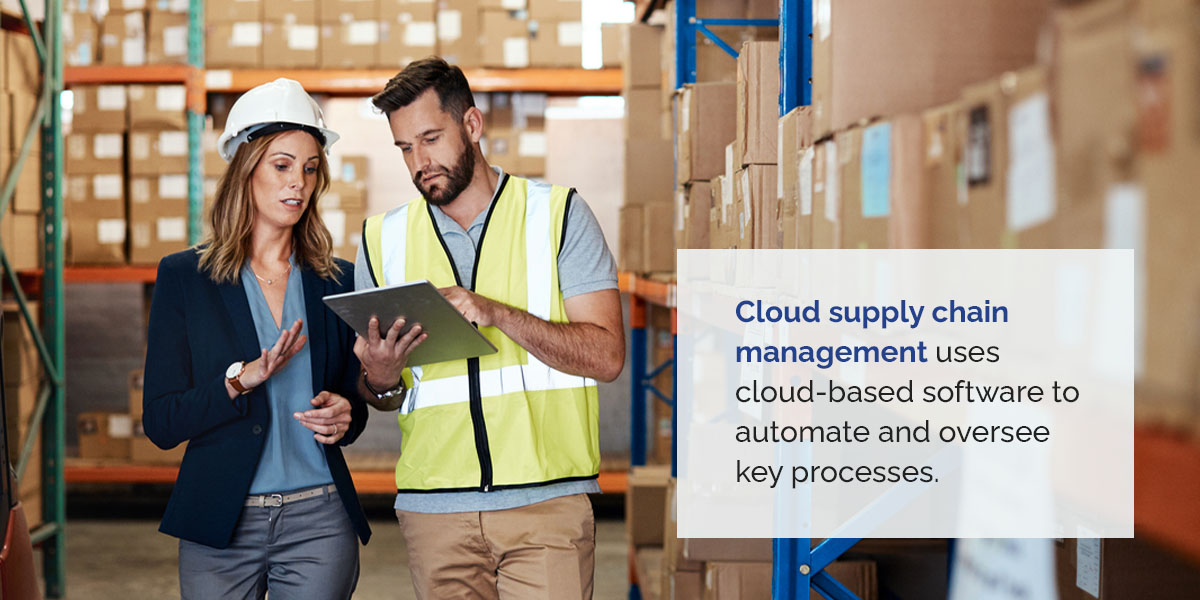Cloud Supply Chain

March 24, 2023
With constant supply chain disruptions and changing consumer demands, many companies see an increased need for automation, enhanced data analytics, and better insights into their operations to improve efficiency. That’s why many companies are already implementing cloud supply chain solutions in their operations. In fact, cloud computing and storage is the most frequently adopted technology by supply chain companies, with 40% using it in 2021 and 86% planning to implement it in the next five years.
Cloud-based software and supply chain management solutions are revolutionizing how supply chain professionals across industries manage and optimize their processes. The competitive advantages of the supply chain cloud for your supply chain are too significant to ignore. But before you can start to take advantage of the cloud, it’s important to understand how a cloud supply chain works, and what the benefits are for your business.
What Is a Cloud Supply Chain?
A cloud supply chain replaces traditional on-premises software and hands-on methods with cloud-based platforms and software that are often interconnected and automated. While traditional supply chain solutions use manual procedures to oversee operations like logistics, inventory management, replenishment, and warehousing, the cloud enables supply chain managers to automate these functions and leverage data analytics to make better-informed decisions.
What Is Cloud Supply Chain Management?

Cloud supply chain management uses cloud-based software to automate and oversee key processes. Implementing cloud computing enables companies to optimize nearly every step of their supply chains.
For example, cloud-based solutions such as electronic data interchange (EDI) software and vendor managed inventory (VMI) platforms allow companies to automate communication with their suppliers and vendors to streamline inventory management, order processing, and other mission-critical functions.
Another critical aspect of how the cloud is used in supply chain management is an enterprise resource planning (ERP) system. ERP systems centralize daily business operations such as accounting, compliance, and procurement to provide transparency into crucial processes. Using a cloud-based ERP platform allows companies to benefit from enhanced intelligence and evolving technologies.
Since all of these platforms and software are based in the cloud, companies can access and manage their data from anywhere with Wi-Fi. These solutions often offer seamless, direct integration with other supply chain platforms, so supply chain managers gain greater insight into transactions and data.
How the Cloud Impacts the Supply Chain
The cloud enhances supply chain capability, flexibility, and security, enabling greater efficiency and resilience. Consider how the cloud can be used to optimize supply chain management:
1. Increased Automation
Automation is one of the most significant benefits of a cloud supply chain. Businesses using cloud computing in the supply chain can automate all sorts of operations, from launching and processing orders, to tracking inventory, to managing the invoice-to-cash cycle, to optimizing warehouse procedures.
Some cloud-based software captures data across your systems and integrates them into a cohesive network. A true cloud supply chain includes multiple pieces of software and platforms that can communicate autonomously via the cloud. This level of automation enables streamlined order management, inventory syncing, and other necessary supply chain processes.
2. Improved Supply Chain Visibility
The cloud’s seamless integrations across other supply chain management platforms provide increased insight into supply chain processes and data. Supply chain managers gain access to highly valuable, real-time data to increase transparency into order and product movements, operations, and cash flow.
3. Streamlined Communication
Effective communication between partners is critical for optimizing the supply chain. When trading partners have effective communication methods in place, they can achieve mutual goals, deliver orders reliably and quickly, and drive efficiency across the supply chain.
Cloud computing in the supply chain takes communication to another level. Cloud-based platforms can collect a plethora of data on sales, product movement, replenishment frequencies, and more. The platform shares this data with supply chain partners to increase your competitive advantage. This can range from order data to inventory numbers in stores, DCs, and warehouses, to invoice and payment information.
4. Reduced Maintenance
Supply chains rely on efficiency and productivity to maintain high performance. With on-premises software and hardware, you are responsible for maintaining the systems, performing manual updates, and expanding the servers as your business needs grow.
A cloud platform eliminates all of those tasks, as the cloud platform provider handles them for its clients. Cloud-based platforms and software are hosted on remote servers, reducing the need for hosted data servers and an in-house IT department to oversee them.
5. Heightened Security
With a cloud supply chain, your data is protected with the latest advancements. Cloud software providers invest heavily in patching, advancements in security architecture, and cybersecurity staff because their business depends on the security of their platforms.
Cloud providers regularly upgrade their systems with the newest versions, security measures, and upgrades to keep your computing power and data security up to date. Cloud providers must also comply with security regulations, making it easier for their customers to take advantage of robust and compliant security measures.
Types of Cloud-Based Supply Chain Software
Many types of cloud-based supply chain software are available that optimize different aspects of the supply chain. Here’s a breakdown of the kinds of cloud-based software companies use to manage every part of their supply chains:
1. EDI
Communicating effectively with trading partners requires accurate document exchange. An EDI solution enables a faster exchange of business documents like purchase orders and order confirmations, reduces errors, and enhances supply chain visibility. EDI also accelerates other key business processes by integrating with an ERP system.
2. Warehouse Management System
Effective inventory management utilizes real-time insights to allocate inventory across distribution centers. Cloud-based warehouse management systems (WMS) provide end-to-end inventory visibility within the warehouse, so companies can better manage raw materials and completed products at that point in the supply chain.
3. ERP
When a customer places an online order, inventory and pricing data should be adjusted across all of the business’s eCommerce storefronts. To manage a complex supply chain efficiently, companies need data to flow seamlessly between multiple business systems, from accounting systems to marketplace portals. An ERP ties these processes together and syncs data between them, ensuring data integrity.
Cloud-based ERP systems allow companies to adopt evolving technologies like artificial intelligence and the Internet of Things to improve their capabilities.
4. Transportation Management System
Planning, organizing, and executing inventory movement can become a complicated task, especially with a global supply chain. Companies use a transportation management system (TMS) to optimize shipments, product movement, and documentation.
A TMS provides visibility into the transportation of a business’s goods, enabling companies to increase customer satisfaction, lower costs, and improve inventory allocation across their distribution centers.
5. VMI
The cloud also empowers companies to improve demand forecasting and proactively respond to supply chain disruptions to mitigate risk.
Optimize order fulfillment with cloud-based supply chain software designed to improve in-stock rates and reduce order cycle time. A VMI system creates replenishment recommendations based on real-time inventory levels and forecasting to automate replenishment. The cloud also enables integrations across platforms for an omnichannel retail strategy that removes boundaries to customers.
Financial Benefits Related to Cloud Supply Chains
Cloud supply chain costs vary by the platforms and solutions your company wants to utilize. If a company exclusively uses a legacy data storage and computing system, switching to the cloud can come with some transitional costs. Many cloud platforms and solution providers also charge an annual fee for their services.
Despite these expenses, using cloud supply chains also provides cost savings in several areas. When companies gain end-to-end visibility into supplier and product performance, logistics, inventory management, and other crucial areas, they can illuminate areas where optimization is needed. This visibility allows companies to improve their processes and cut costs.
In addition, cloud-based platforms don’t require any software purchases, and fully-managed cloud services reduce personnel costs. For instance, companies can outsource system maintenance, compliance, and process automation when they switch to fully-managed EDI services. Utilizing these services allows companies to redeploy their resources and energy into core business tasks.
Cloud Solutions Can Boost Your Supply Chain
Changing supply chain demands call for innovative and comprehensive solutions. The cloud offers a wide range of platforms and software solutions to improve supply chain management at every step. From increased visibility into the supply chain to improved supplier relationships and communication, your business can significantly boost its competitive advantages with a cloud supply chain.

TrueCommerce provides a single suite of supply chain management solutions to integrate your supply chain seamlessly. Our powerful, cloud-based platform keeps your team on top of critical supply chain management processes. To learn more about what TrueCommerce can do for your business, contact us and request a demo.
Share this post:
Categories
Stay ahead of the competition
Get expert supply chain insights delivered directly to your inbox weekly.